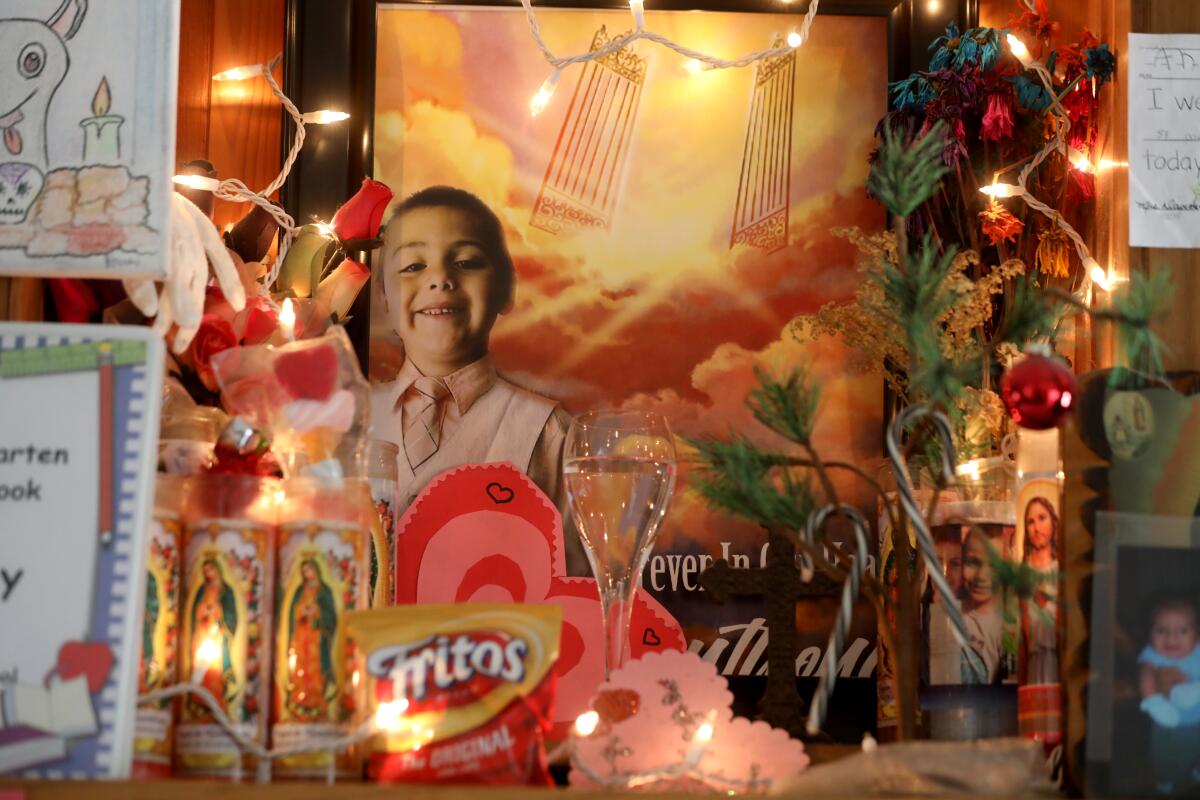Prosecutors will no longer seek death penalty in the Anthony Avalos torture case

- Share via
Prosecutors will no longer seek the death penalty for the mother of Anthony Avalos and her boyfriend, who are accused of torturing the 10-year-old Lancaster boy for days before his death in 2018, Los Angeles County Dist. Atty. George Gascón’s office confirmed Saturday.
A grand jury indicted Heather Maxine Barron, 31, and Kareem Ernesto Leiva, 35, in October 2018 on charges that they murdered the boy and abused two other children in the household.
Barron and Leiva are being held without bail. Both have pleaded not guilty.
Prosecutors have said the couple poured hot sauce on Anthony’s face and mouth, whipped the boy with a looped cord and belt, and held him upside down and dropped him on his head repeatedly. They also alleged that the couple alternately withheld food and force-fed him, slammed him into furniture and the floor, denied access to the bathroom, and enlisted other children in the home to inflict pain on the boy.
Anthony’s wounds stretched from head to toe as bruises, abrasions, red dots, scabs, cuts and a traumatic brain injury, prosecutors have said. In addition to the injuries suffered by Anthony that resulted in his June 21 death, prosecutors have said that Leiva previously struck one of his brothers so hard that the boy required a trip to the hospital and staples on his head.
The case of 10-year-old Anthony Avalos exposes serious failures by the Los Angeles County child protection system to intervene before his death.
The decision not to seek capital punishment came as a shift from the strategy pursued by the office of Gascón’s predecessor, former Dist. Atty. Jackie Lacey. Prosecutors had announced in court in 2019 that they would pursue the death penalty against Barron and Leiva.
Gascón unseated Lacey after running on a progressive platform of criminal justice reform. He issued a directive barring prosecutors from seeking the death penalty in new cases as part of a series of sweeping policy changes he enacted after taking office last year. The move fulfilled a campaign promise but sparked backlash from some current and former prosecutors, local law enforcement officials and crime victims. A campaign to recall Gascón was launched soon after he was elected.
A spokesman for Gascón’s office noted that there is a moratorium on executions in California, where no one has been put to death since 2006.
“Seeking death in these cases subjects victims to decades of appeals — forcing them to relive their trauma repeatedly — for a sentence that will simply never be imposed,” the spokesman said in a statement. “It is also extremely expensive, with California spending over $5 billion on the death penalty since 1978 — a cost to taxpayers of nearly $400 million per execution.”
But Gascón has made at least one exception, writing in court papers in February that he would not order lawyers to ask for dismissal of the death penalty jury verdict in the case of Michael Gargiulo, who was convicted in 2019 of killing two women and seriously injuring another in a series of knife attacks.
In the same filing, however, Gascón also ordered prosecutors to read a statement that notes the district attorney “does not believe the death penalty is an appropriate punishment in any case,” and asks the judge to consider his opposition to capital punishment before he sentences Gargiulo this year.
An advisor to the district attorney said at the time that the move did not represent a change in policy but rather a rare exception necessitated by a complicated legal situation. Gargiulo was convicted while Lacey was still in office, but his sentencing hearing was delayed by a number of post-conviction hearings and the courthouse backlog caused by the COVID-19 pandemic.
Anthony’s case struck many people as having similarities to the 2013 death of 8-year-old Gabriel Fernandez of Palmdale, whose mother and her boyfriend were convicted of his torture murder.
Both the Los Angeles County Sheriff’s Department and the Los Angeles County Department of Children and Family Services have come under criticism by some of Anthony’s family members and community protesters for not permanently removing the boy from the home and not arresting Barron and Leiva on suspicion of child abuse.
Both agencies received calls about abuse in the household, with school administrators, a teacher, a counselor, family members and others contacting law enforcement or the county child abuse hotline more than a dozen times.
They included a referral in April 2014 alleging that Leiva hit Anthony and three siblings with various objects, including a hose. The caller alleged that Barron screamed at the children and locked them in their rooms for hours.
In September 2015, a caller said that Anthony and his siblings were being hit by Leiva and that a brother was dangled upside down from the staircase. Another caller the same month said Leiva and Barron made the children squat for long periods. Yet another caller that month said Leiva slammed Anthony and one of his brothers onto the floor and locked the children in a room where he threw dirty diapers at them.
In April 2016, another caller said Leiva was again physically abusing the children and withholding food from them.
After his death, Anthony’s biological father and siblings filed a lawsuit against the county, the DCFS and one of its contractors, alleging that social workers willfully disregarded concerns about abuse and failed to protect Anthony.
Times staff writer James Queally contributed to this report.
More to Read
Sign up for Essential California
The most important California stories and recommendations in your inbox every morning.
You may occasionally receive promotional content from the Los Angeles Times.












